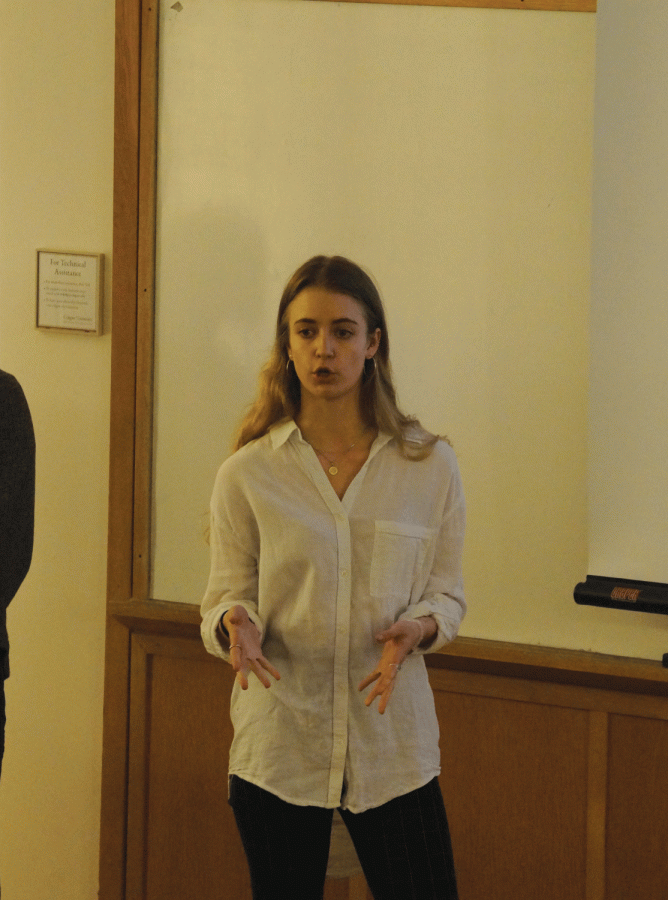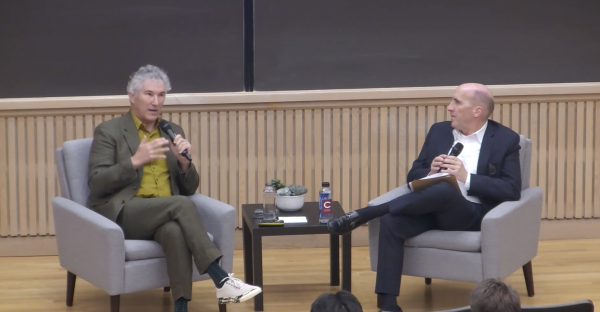ENST 390 Students Present on Community Challenges and Sustainable Solutions
Junior Isabella Vendramin presents her work for ENST 390 class, whose projects focused on community challenges and sustainable solutions on April 26.
Four groups of students in the Environmental Studies (ENST) 390 course presented their final projects to an audience of Colgate students, faculty, Hamilton Village members and Oneida Nation school students on Friday, April 26 in Persson Auditorium.
The ENST 390 course is an interactive course in which six groups of students pick a project relating to an environmental issue in the local community and attempt to come up with a framework of solutions by working with organizations such as the Office of Sustainability, Colgate administrators, town members, town leaders and their classmates.
The student groups had to select a project involving the local community and the environment that would be approved by a panel of faculty prior to beginning their research.
The course aims to provide an outlook as to what careers in sustainability and environmental fields are like, as well as to give students the experience of working with different environmental agencies and independently using local resources.
The first two presentation groups focused on environmental resilience efforts in the village of Hamilton, analyzing the potential effects climate change will have on the local community.
The third presentation group also focused on environmental resiliency efforts, but concentrated specifically on the Colgate campus.
The final presentation group researched the detrimental effects that paper towels have on the Colgate community, recommend- ing that hand driers and hand sanitizer stations be installed, particularly in the library, to save waste and potentially $100,000 over a ten-year period.
All four of the groups strived to incorporate the pillars of sustainability into their presentations, targeting each specific pillar—social, environmental and economic—in their respective projects.
Many students in the course attended the Hamilton Climate Resiliency Workshop hosted at the Colgate Inn on March 30 to kickstart their research and gain a foundational understanding of Hamilton’s sustainability efforts. The individual groups then identified major issues affecting their topics of choice, and outlined an analytical framework to attempt to solve each issue.
Each group concluded their presentations with recommendations of solutions, spanning from the implementation of more sustainable agricultural techniques to bulking up emergency response systems and becoming a Climate Smart Community.
Each group involved with members of the Hamilton community.
Many audience members praised the dedication and research the students did to provide a step-by-step plan to improve specific issues.
Hamilton Mayor RuthAnn Loveless discussed the importance of the students’ work and said it was helpful in enacting the initiatives of town members.
“I am so grateful for the guidance and the support that Colgate provides for us in this process of becoming a Climate Smart Community,” Loveless said. “We have limited staff, they’re hardworking, they’re overworked and the kind of direction as well as actual work that students and professors have done over the past year, have been immeasurable for us.”
Contact Nicole Dienst at ndienst@colgate.edu.
Nicole Dienst is a senior from Westport, CT, studying English, economics and environmental studies. Prior to serving as Executive Editor, she has held...





